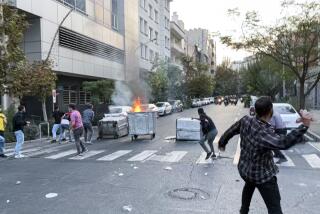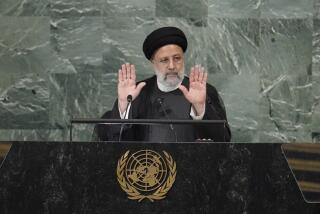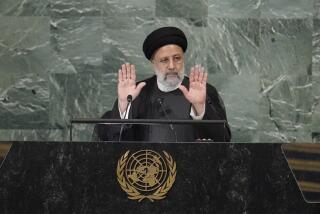Iran official: Nuclear talks are ‘historic opportunity’ for change
GENEVA -- Iran’s foreign minister has embarked on a personal effort to promote the international talks over Iran’s nuclear program, and appears to be suggesting a way Iran and the West can finesse the touchy question of Iran’s “right” to enrich uranium.
With a new round of talks scheduled to begin here Wednesday, Mohammad Javad Zarif released a five-minute online video Tuesday that describes the negotiations as a “historic opportunity” and urges the West to participate with respect and equal treatment of Iran so that they can lead to a successful outcome.
In the video, posted with subtitles in several languages, Zarif says in English that in Iran’s presidential elections last June “our people chose constructive engagement through the ballot box. And through this, they gave the world an historic opportunity to change course.”
The video, entitled “Iran’s Message: There Is a Way Forward,” appears aimed at convincing foreign audiences that Iran wants a deal, and also at building support for the initiative at home.
The election has been widely interpreted as giving President Hassan Rouhani a mandate from Iranians to try to negotiate a deal that will ease the punishing Western sanctions on Iran’s economy in return for limits on a nuclear program that many countries fear is aimed at developing a weapons capability.
Representatives of Iran and six world powers, including the United States, are believed to be close to a first-stage agreement. This week’s negotiations will be the third session in a little more than a month.
In comments on Sunday, Zarif seemed to suggest that the world powers didn’t need to explicitly recognize what Iran claims to be its “right to enrich,” so long as they didn’t stand in the way of enrichment.
“We believe that Iran’s enrichment right is nonnegotiable and there is no necessity to recognize it as a right, because it is an inseparable right which should be respected by all sides,” Zarif said, according to the government-controlled ISNA news agency.
He said the U.S. stance in opposing Iran’s assertion of its legal right “does not mean that they are against Iran’s enrichment.”
Iran claims that the Nuclear Nonproliferation Treaty gives countries a right to enrich, an assertion that the United States denies. U.S. officials haven’t ruled out giving Iran an international blessing for limited, peaceful uranium enrichment. They have said that if Iran takes the many steps required to assure the world it is not seeking a nuclear bomb, it could then bargain for such an authorization.
But if Iran continues to insist on a public acknowledgment of its “right” to enrich uranium, it would put the Obama administration in a bind and possibly threaten the progress of talks.
One diplomat said the six powers might be able to provide a de facto blessing for Iranian enrichment, “but not de jure,” because several countries at the table don’t believe that the treaty provides that kind of legal authorization.
Iran ended the last round of talks insisting on public acknowledgement of this right, U.S. officials said.
Although Iran and Russia have been notably upbeat about the talks, U.S. officials have been more cautious, perhaps to avoid ratcheting expectations too high.
Secretary of State John F. Kerry, who said on Nov. 11 that the talks had been “extremely close” to a deal, dialed that back on Monday, saying he had “no specific expectation” on how the discussions would go this week.
The negotiations are expected to run through Friday, but could spill over to the weekend.
ALSO:
‘Selfie’: 2013’s word of the year
7 Afghan children killed by bomb while playing, officials say
Toronto Mayor Rob Ford remains defiant despite gutted authority
Staff writer Richter reported from Geneva and special correspondent Mostaghim from Tehran.
More to Read
Sign up for Essential California
The most important California stories and recommendations in your inbox every morning.
You may occasionally receive promotional content from the Los Angeles Times.











